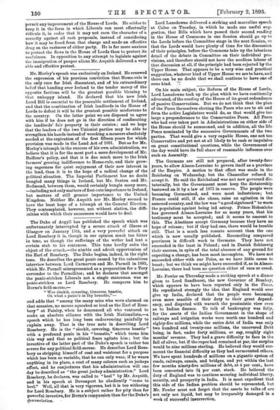The Duke of Argyll has published the speech which was
unfortunately interrupted by a severe attack of illness at Glasgow on January 15th, and a very powerful attack on Lord Rosebery it is, though in our opinion much too bitter in tone, as though the sufferings of the writer had lent a certain stab to his sentences. This tone hardly suits the object of the attack,—the nimble and adroit opportunism of the Earl of Rosebery. The Duke begins, indeed, in the right tone. He describes the great panic caused by the calamitous interview between Lord Carnarvon and Mr. Parnell in 1885, which Mr. Parnell misrepresented as a preparation for a Tory surrender to the Parnellites; and he declares that amongst the panic-stricken Liberals not a single statesman was so panic-stricken as Lord Rosebery. He compares him to Burns's field-mouse,- " Wee sleekit, cowering, timorous beastie, Oh what a panic's in thy breastie,"— and adds that " among the many mice who were alarmed on that occasion, no mouse squeaked so loud as the Earl of Rose- bery" at Paisley, when he denounced all who ventured to make an absolute alliance with the Irish Nationalists,—a speech which he has long been endeavouring painfully to explain away. That is the true note in describing Lord Rosebery. He is the " sleekit, cowering, timorous beagle " with a profound panic in his " breastie," which turns him this way and that as political fears agitate him ; but the invective of the latter part of the Duke's speech is rather too severe for any political field-mouse. He describes Lord Rose- bery as stripping himself of coat and waistcoat for a purpose which has been so variable, that he can only wear, if he wears anything in its place, a coat of many colours such as jockeys affect, and he conjectures that his administration will one day be described as "the great jockey administration." Lord Rosebery, he declares, was called to "heel" by Mr. Asquith, and in his speech at Devonport he obediently "came to heel." Well, all that is very vigorous, but it is too withering for Lord Rosebery. He is a subject rather for pity than for powerful invective, for Ei4rDie6 cgifipassion than for the Duke's dennnciation.


































 Previous page
Previous page